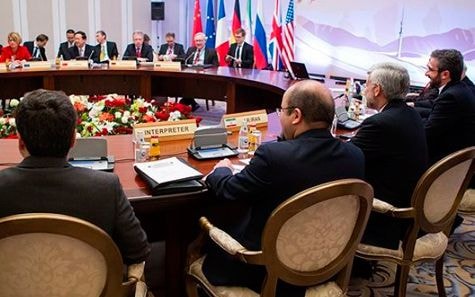Turning point for Iran nuclear issue?
(Baonghean) - US Secretary of State John Kerry has just had a surprise meeting with his Iranian counterpart Mohammad Javad Zarif to conduct new discussions on Iran's nuclear program on the sidelines of the Munich Security Conference, Germany. According to the European Union High Representative for Foreign Affairs and Security Policy Federica Mogherini, the nuclear negotiations have reached an important stage and now is the time for a final agreement.
These important moves are opening the door to a final agreement on the Iranian nuclear issue. So why are these moves being made by the West? Is there a turning point for the Iranian nuclear issue?
 |
| A round of negotiations on Iran's nuclear program. Photo: PressTV |
Immediately after the meeting with the US Secretary of State, the Iranian Foreign Minister said the discussion was very serious. The head of Iran's diplomacy affirmed that he and his partners are trying to reach an agreement as soon as possible, but also admitted that there is great suspicion between Iran and the US. Iranian Foreign Minister Zarif also said that continuing to extend the deadline for nuclear negotiations is useless and does not benefit anyone.
It can be seen that the disagreements on the Iranian nuclear issue that have lasted for a long time have made the US and the West feel impatient. The fact that the US Secretary of State spent time meeting the Iranian Foreign Minister twice in Munich, Germany can be considered a surprising move but not a new one. After many meetings without results, continuously postponing the negotiation rounds, the Iranian nuclear issue has become one of the long-standing complicated problems that the US and the West are facing. However, the current developments in the world may have coincidentally become a factor that pushes the US, the West and Iran to find a way to resolve the conflict related to the nuclear issue.
For the US and the European countries in the P5+1 group including the UK, Germany and France, it seems that the Ukraine crisis has cost them a lot of effort in finding a solution. The Ukrainian battlefield has also become a hidden "confrontation" between East and West. Moreover, the US and key EU countries such as Germany and France still have many disagreements related to resolving this crisis. A series of visits by leaders and heads of foreign affairs of the US, UK, France and Germany have been carried out. However, the Iranian nuclear issue has not been put aside. The negotiation schedule is still set, diplomatic statements are still made and communication channels are still maintained. More importantly, the US and Western sanctions are still applied to the Islamic State of Iran.
The push for Iran nuclear negotiations also comes from the US administration. In the second half of his second term, President Obama likely wants to create an important diplomatic mark that can score points in the eyes of the American people, creating an advantage for President Obama's Democratic Party in the 2016 White House race. Another factor that makes the West unable to ignore Iran's role is that in the context of the West "fighting" with Russia in Eastern Europe, Iran shows a tendency to ally with Russia to deal with the West. This is clearly something the West does not want. Meanwhile, Iran is increasingly influential in the Middle East, has good relations with Iraq, and can make useful contributions to the current international coalition's fight against IS.
For its part, Iran is also taking advantage of the West's "busyness" in Eastern Europe to speak up. In addition to declaring its readiness to actively negotiate with the West, Iran still shows its tough stance. Recently, speaking at a meeting with Iranian air force generals, the country's Supreme Leader, Grand Ayatollah Ali Khamenei, stated: No agreement is better than an agreement that affects the country's interests. This shows that Iran will not easily comply with the West's wishes but will maintain its stance. Therefore, it is not possible to say in advance whether Iran or the West will give in first in the round of negotiations at the end of March for a political agreement, followed by a final agreement on June 30. If both sides firmly defend their positions, the Iran nuclear issue will remain a vicious circle without being able to find a straight path to the destination to solve the problem.
Nguyen Cao Bien
